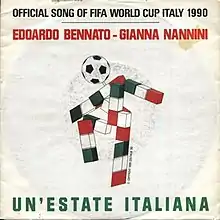Un'estate italiana
"Un'estate italiana" (Italian, pronounced [uneˈstaːte itaˈljaːna]), "To be number one" (English) or "Un verano italiano" (Spanish; both meaning "An Italian summer") is the official song of the 1990 FIFA World Cup held in Italy. The song was composed by Giorgio Moroder with lyrics by Tom Whitlock. The Italian version, also known as "Notti magiche" ("Magical nights") in Italy, was recorded by Italian artists Edoardo Bennato and Gianna Nannini, who also wrote the Italian lyrics. The Spanish version, also known as "Noches mágicas" in Spanish, was recorded by Paraguayan Susan Ferrer, who also wrote the Spanish lyrics.
| "Un'estate italiana" "To be number one (English version)" "Un verano italiano (Spanish version)" | ||||
|---|---|---|---|---|
 | ||||
| Single by Edoardo Bennato and Gianna Nannini Susan Ferrer (Spanish Version) | ||||
| B-side | "Karaoke version" | |||
| Released | 9 December 1989 | |||
| Recorded | 1989 | |||
| Genre | Pop rock | |||
| Length | 4:07 | |||
| Label | ||||
| Composer(s) | Giorgio Moroder | |||
| Lyricist(s) |
| |||
| Producer(s) | Giorgio Moroder | |||
| Gianna Nannini singles chronology | ||||
| ||||
| Edoardo Bennato singles chronology | ||||
| ||||
| Music video | ||||
| "Un'estate italiana" on YouTube | ||||
The song achieved success on the charts of several European countries.
Release
For the Italian release, Moroder addressed Gianna Nannini and Edoardo Bennato, who rewrote the lyrics and took the song to the top of the charts in Italy and Switzerland. From January to September 1990, the song was the best-selling single in Italy. The song was presented for the first time by the two singer-songwriters in Milan in December 1989, and performed live during the opening ceremony, held on 8 June 1990, in Milan, before the Argentina–Cameroon opening match, followed later also by the English version. It describes the desire to win, and score a goal.
The song was among the first to contain a single instrumental version (indicated as a karaoke version) and to be published as a maxi single.
English version
The English version, released under the name "To Be Number One", and performed by Giorgio Moroder Project (Singers: Joe Milner, Moll Anderson, Paula Mulcahy Keane)[1] was the opening theme to RAI TV programmes and matches related to the 1990 FIFA World Cup.
Cover versions
In 1990, Hong Kong singer Alan Tam covered this song in Cantonese under the title "Ideals and Peace" (Yue Chinese: 理想與和平).
In 2014, The Italian Tenors covered this song.
Track listings
- 7" single
- "Un'estate italiana" – 4:07
- "Un'estate italiana" (karaoke version) – 4:07
- 12" maxi
- "Un'estate italiana" (stadium version) – 4:50
- "Un'estate italiana" (7" version) – 4:07
- "Un'estate italiana" (karaoke version) – 4:07
- CD maxi
- "Un'estate italiana" (stadium version) – 4:50
- "Un'estate italiana" (single version) – 4:07
- "Un'estate italiana" (karaoke version) – 4:07
Charts and sales
Peak positions
|
Year-end charts
Certifications
| |||||||||||||||||||||||||||||||||||||||
References
- Moll Anderson Returns to 1989 With Serious Bomb Girl Style
- "Un'estate italiana", in various singles charts Lescharts.com (Retrieved April 19, 2009)
- 1990 Austrian Singles Chart Austriancharts.at Archived 2013-12-17 at the Wayback Machine (Retrieved April 19, 2009)
- "Eurochart Hot 100 of 1990" (PDF). Music & Media. Vol. 7, no. 51. 22 December 1990. p. 60. OCLC 29800226. Retrieved 15 January 2020 – via American Radio History.
- 1990 Swiss Singles Chart Hitparade.ch (Retrieved April 19, 2009)
- "Gold-/Platin-Datenbank (Edoardo Bennato/ Gianna Nannini; 'Un' Estate italiana')" (in German). Bundesverband Musikindustrie.
- "Italian single certifications – Edoardo Bennato & Gianna Nannini – Un'estate italiana" (in Italian). Federazione Industria Musicale Italiana. Retrieved 19 July 2021. Select "2021" in the "Anno" drop-down menu. Select "Un'estate italiana" in the "Filtra" field. Select "Singoli" under "Sezione".
- "Guld- och Platinacertifikat − År 1987−1998" (PDF) (in Swedish). IFPI Sweden. Archived from the original (PDF) on 2011-05-17.